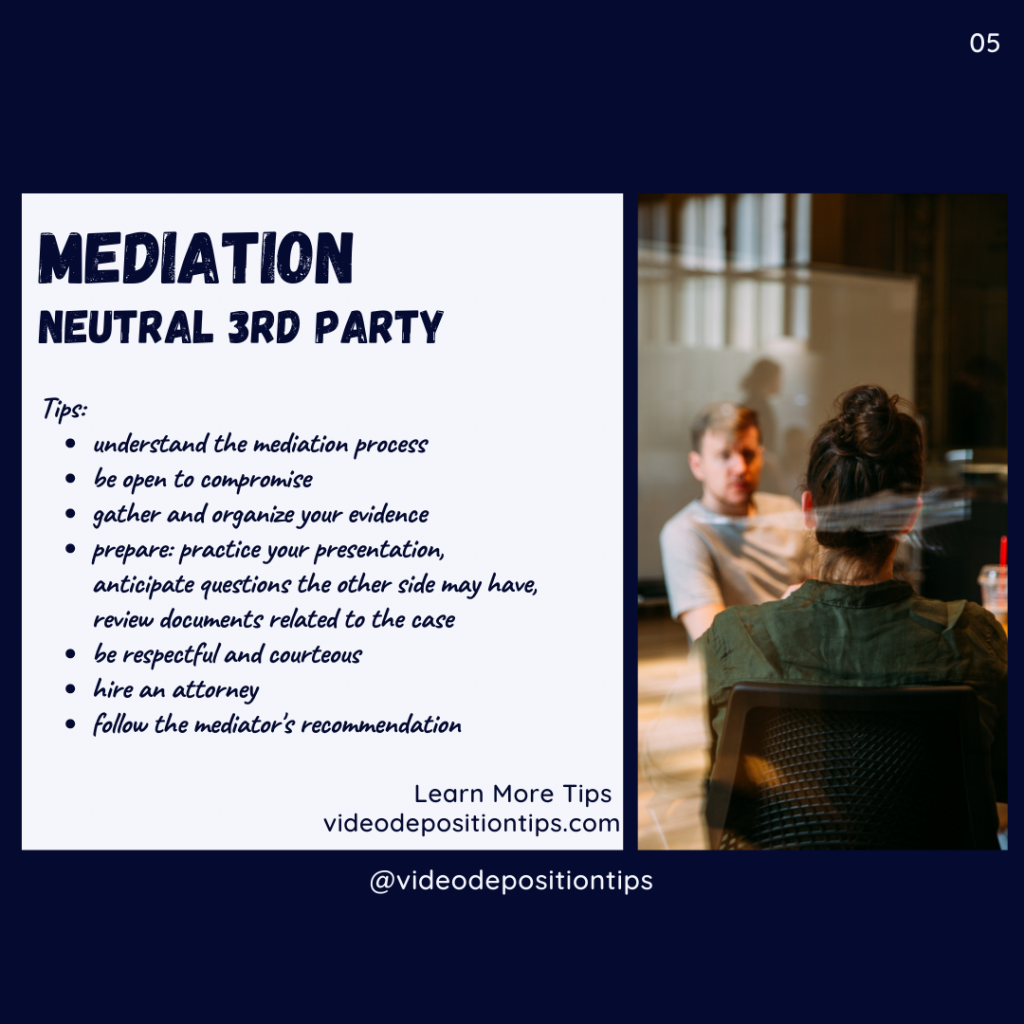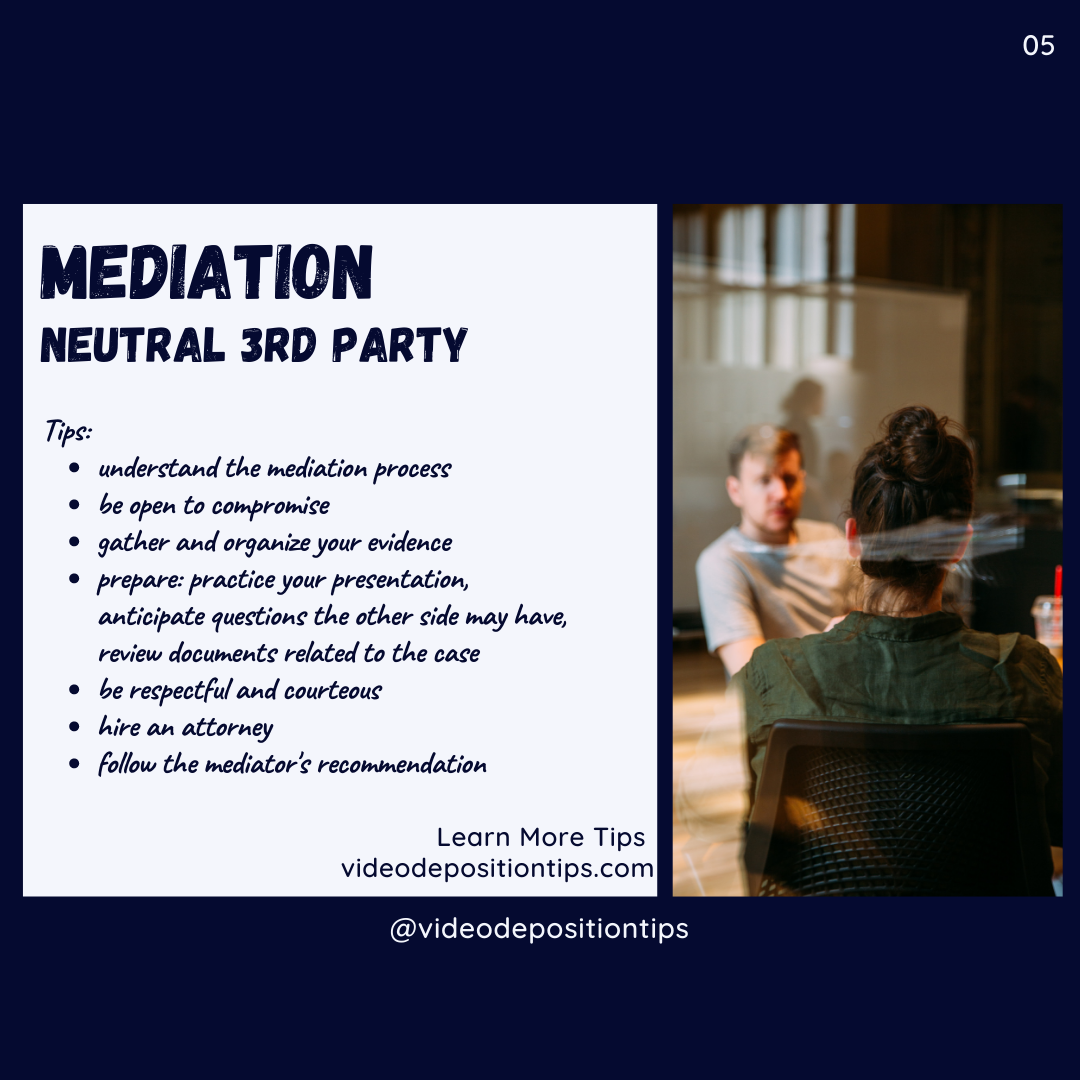If you’ve been “invited” to mediation and are looking for some mediation tips, then keep reading for some resources that might help you in this process. It CAN be stressful if you’re new to this process, but you can prepare to put your best foot forward.
Quick tip before moving on – if you’re finding the tips on this website helpful – be sure to save this page or send a link to the site – to a friend or trusted advisor who’s going through this mediation process with you. It’s easy to “lose things” – and we don’t want you to lose our free resources 🙂

What is mediation and why is it part of the legal system?
Mediation is a process by which parties in a dispute agree to have their case resolved by a neutral third party, called a mediator, rather than by a judge or jury in a court of law. The mediator is typically a lawyer or other professional trained in dispute resolution, and their role is to help the parties reach a mutually acceptable agreement to resolve their dispute.
Mediation is an important alternative to the court system for several reasons. One reason is that it can be faster and less costly than going to court. Because mediation is typically a less formal process than a court case, it can be less time-consuming and expensive to participate in.
Another reason why mediation is important is that it allows the parties to have more control over the resolution of their dispute. In a court case, the judge or jury makes the final decision, but in mediation, the parties have the opportunity to work together to find a resolution that is acceptable to both sides.
Mediation can also be an effective way to preserve relationships, particularly when the parties have a ongoing relationship, such as in business or family disputes. Because the mediator helps the parties communicate and work towards a mutually acceptable agreement, it can help to preserve relationships that may have been damaged by the dispute.
Finally, mediation can be an effective way to resolve disputes because it allows the parties to choose a mediator who has expertise in the specific area of law related to the dispute. This can be particularly useful when the parties are involved in a complex or specialized legal matter.
Overall, mediation is an important alternative to the court system that can provide a faster, less expensive, and more collaborative way to resolve disputes.
How does the mediation process work?
The mediation process for resolving disputes often involve the following steps:
- The parties agree to mediate: The parties in the lawsuit agree to participate in mediation in order to try to resolve their dispute. They may choose to mediate voluntarily, or they may be ordered to mediate by a court.
- The parties choose a mediator: The parties choose a mediator to facilitate the mediation process. The mediator is typically a lawyer or other professional trained in dispute resolution.
- The parties prepare for the mediation: The parties gather and organize any evidence or documents they will need to present their case, and they may also prepare statements or presentations outlining their position.
- The mediation session takes place: The parties, the mediator, and any attorneys or other representatives meet to discuss the dispute and try to reach a mutually acceptable resolution. The mediator helps the parties communicate and work towards a resolution.
- The parties reach a resolution: If the parties are able to reach a resolution to their dispute, the mediator will help them document the terms of the agreement in a written settlement agreement. If the parties are unable to reach a resolution, the mediation process ends, and the parties may need to pursue other options, such as going to court.
Overall, the mediation process for resolving a lawsuit is a collaborative process that involves the parties working together with a neutral mediator to try to find a mutually acceptable resolution to their dispute. It is typically a less formal and less expensive alternative to going to court.
What tips do you have for someone entering into mediation?
If you are participating in mediation to resolve a lawsuit, here are some tips that may be helpful:
- Understand the mediation process: It is important to have a clear understanding of how the mediation process works, including the role of the mediator, the rules that will apply, and the timeline for the proceedings.
- Be open to compromise: Mediation is a collaborative process, and it is important to be open to finding a mutually acceptable resolution to your dispute. This may require you to make concessions or compromises that you may not have been willing to make in a court case.
- Gather and organize your evidence: Just as you would in a court case, it is important to gather and organize your evidence in support of your position. This may include documents, witness statements, and other relevant materials.
- Prepare for the mediation: Take the time to prepare for the mediation session. This may include practicing your presentation, anticipating questions that may be asked, and reviewing any relevant documents or materials.
- Be respectful: Remember that you are in a formal legal setting, so it is important to be respectful and courteous to everyone involved in the case, including the mediator and any lawyers or witnesses.
- Consider hiring an attorney: Depending on the complexity of your case, it may be beneficial to hire an attorney to represent you in the mediation proceedings. An attorney can provide legal advice and guidance, and can help you navigate the process.
- Follow the mediator’s recommendations: The mediator’s recommendations are not binding, but they can be helpful in facilitating a resolution to the dispute. It is important to consider the mediator’s recommendations and be open to finding a resolution that is acceptable to both sides.
Overall, it is important to approach mediation with a clear understanding of the process and a willingness to work towards a mutually acceptable resolution. By following these tips, you can increase your chances of a successful outcome.


